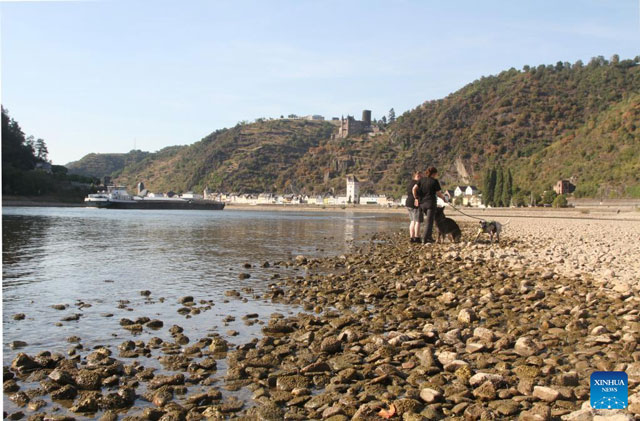
Water level of river Rhine drops due to high temperature, drought in Germany
Berlin, Germany | BBC | As Europe lives through a long, hot summer, one of the continent’s major rivers is getting drier – posing major problems for the people and businesses that rely on it.
Captain Andre Kimpel casts an experienced, but worried, eye across the river Rhine, where water levels have dropped significantly in recent days.
Several ferry services in and around the town of Kaub have been forced to a standstill, but he’s still carrying people and their cars across the water to the opposite bank – for now.
“It’s no joke,” he says as he navigates the water which sparkles in the summer sunshine. “We have 1.5m [5ft] of water and our boat sits 1.20m deep. So we have 30 centimetres of water left beneath us.”
It’s not unusual for water levels to drop here but, Captain Kimpel says, it’s happening more frequently. “We used to have a lot of floods. Now we have a lot of low waters.”
On the riverbank nearby, there’s an old measuring station. Any skipper wanting to enter the Upper Rhine will refer to the official water level recorded here.
It’s currently 42cm – but is forecast to fall further in the coming days.
Travel a little further upstream and the challenge is obvious.
At the town of Bingen, great swathes of the riverbed are exposed, bleached stones powder dry in the baking sun. People from the nearby town pick their way over the rocks, take photographs. In normal times they’d be underwater. One man told me he’d never seen it like this.
A few commercial vessels slowly navigate the channel of water that’s left here.
The Rhine is one of Europe’s great working rivers and industry here relies on barges to fetch and carry raw materials and finished products to and from the power plants and factories that line the riverbank.
The water’s already too low to allow some of the larger vessels through. Others have been forced to reduce their cargo, lighten the load so that they sit higher in the water. And they’re keeping a close eye on the river levels.
******
SOURCE: BBC NEWS
 The Independent Uganda: You get the Truth we Pay the Price
The Independent Uganda: You get the Truth we Pay the Price


